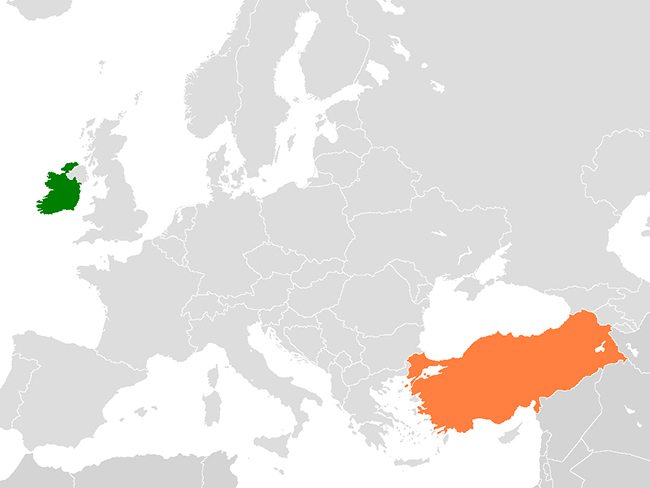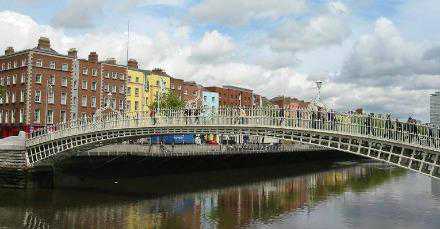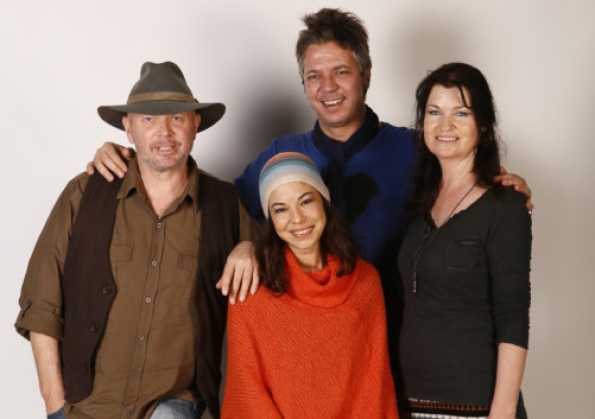
Mr Gilmore visiting the Nazip camp near the city of Gaziantep, close to the Syrian border, yesterday
Colm Keena
Ireland has announced the donation of a further €1 million towards the work of the Turkish government in dealing with the refugee crisis caused by the war in Syria, bringing the total donated to date to €8.15 million.
The Tánaiste and Minister for Foreign Affairs and Trade, Eamon Gilmore, announced the move in Turkey where he has met with his counterpart, Ahmet Davutoglu, and yesterday visited a camp near the Syrian border.
He said he wanted to demonstrate Ireland’s support for Turkey’s humane response to the suffering of the people who have been displaced by the widespread violence inside Syria. Without the responsible and charitable actions of the countries neighbouring Syria, the plight of its people would be even greater, he said.
Awaiting registration
He praised Turkey for keeping its border open. The money will go to the Red Cross and the UNHCR. Approximately 1.25 million people who fled Syria have been registered or are awaiting registration as refugees in neighbouring countries, with more than 230,000 of these being in Turkey.
The Ankara government estimates that up to 400,000 people have left Syria for Turkey. The effort to help the refugees has cost the Turkish government approximately $750 million to date and, with the numbers coming into the country having risen by 28 per cent since January, the government and aid agencies are struggling to cope.
Almost 3,000 children have been born to refugees in Turkey since the crisis began two years ago.
Turkey has 17 camps for refugees with another, in Midyat, being established for Orthodox Christian Syrians who are fleeing the fighting. Some of the oldest Christian monasteries in the world are located in southeastern Turkey.
Mr Gilmore visited the Nazip camp near the city of Gaziantep, close to the Syrian border, yesterday.
Temporary home
The camp, which is on stony ground on the banks of the Euphrates alongside the large Birecik Baraji dam, opened late last year and is serving as a temporary home to thousands of Syrians who are living in tents and Portacabin-type homes.
When the Tánaiste walked out of the school compound into the general camp area, he was immediately surrounded by camp residents showing him their identity cards and wanting to tell him of their plight.
Camp resident Ayob Doghouz (26) said that he left Damascus two weeks ago because he did not want to do military service.
“If you join, then your destiny is to kill someone or to be killed. I came here to escape that destiny.” He said he was glad to be in the camp because he was now safe but was unhappy that he was not allowed to go in and out of the camp as he pleased.
“I would rather be in my homeland but here you can say I am secure. But it is like living in a big prison.”
Fadi Al Hadike (16), who walked with the aid of a crutch, said he was injured in his left leg some weeks ago in Aleppo, just across the border in Syria, when a rocket blew up near him. His home was destroyed.
Received treatment
He was taken to Turkey and received treatment, and was now living in the camp with his mother and other members of his family. His mother’s sister was outside the camp and wanted to be allowed in, he said on behalf of his mother.
“She is injured. She is at the gate and wants to get in. She has one dead son and another injured.”
Mazen (47), who did not want his last name used, said he had come to Turkey from Damascus because of the fighting there. A welder who had spent 17 years in the United States, he fled Syria six months ago with his family, staying first in one camp and then being moved to Nazip. “It is better here but it is too crowded.”
A married man with two children, who also has relatives in the camp, he said he did not know when he would be able to return home. “We don’t know how long the problems in Syria are going to last. It is getting worse every day.”
via Ireland to give further €1m to help Syrian refugees – European News | Latest News from Across Europe | The Irish Times – Tue, Apr 09, 2013.





